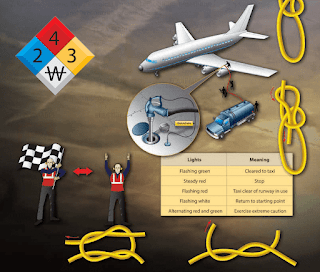Aircraft maintenance technicians (AMTs) devote a portion of their aviation career to ground handling and operating aircraft. Technicians also need to be proficient in operating ground support equipment. The complexity of support equipment and the hazards involved in the ground handling of aircraft require that maintenance technicians possess a detailed knowledge of safety procedures used in aircraft servicing, taxiing, run-up, and in the use of ground support equipment.
For example, the fuel tanks of transport aircraft contain large amounts of highly flammable fuel and, therefore, can pose a considerable risk of fire. In addition, rotating propellers and operating turbojet engines present a serious risk of injury or death to ground personnel. Therefore, you must make every effort to prevent injury to personnel and damage to aircraft while maintenance and servicing are being performed. The information provided in this site is intended as a general guide for safely servicing and operating aircraft.
Accidents in the workplace are one of the leading causes of death and disability. One reason for this is that after working at a job for a period of time, many people become complacent and do not give workplace safety the attention it requires. Aircraft operation areas contain many dangers to personnel, but a sound safety program and an aware workforce can reduce these dangers dramatically. Make workplace safety one of your primary job duties.
Introducing human factors to aircraft maintenance personnel makes them aware of how it affects maintenance performance. Although there are many human factors involved when dealing with maintenance performance, several areas can be considered. Some of these include fatigue, deadline pressure, stress, distractions, poor communication skills, complacency, and lack of information. Maintenance technicians need to understand how human factors can impact their performance and safety while completing maintenance tasks.
Accidents in the workplace are one of the leading causes of death and disability. One reason for this is that after working at a job for a period of time, many people become complacent and do not give workplace safety the attention it requires. Aircraft operation areas contain many dangers to personnel, but a sound safety program and an aware workforce can reduce these dangers dramatically. Make workplace safety one of your primary job duties.
Introducing human factors to aircraft maintenance personnel makes them aware of how it affects maintenance performance. Although there are many human factors involved when dealing with maintenance performance, several areas can be considered. Some of these include fatigue, deadline pressure, stress, distractions, poor communication skills, complacency, and lack of information. Maintenance technicians need to understand how human factors can impact their performance and safety while completing maintenance tasks.

